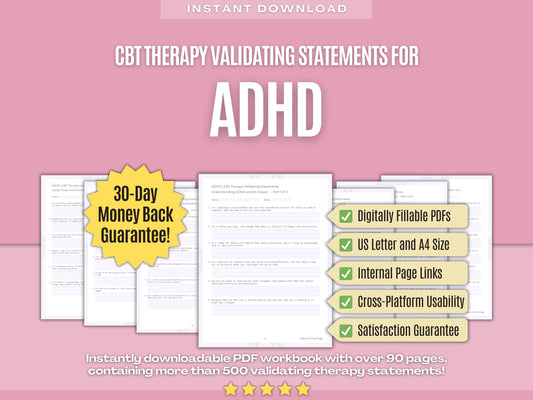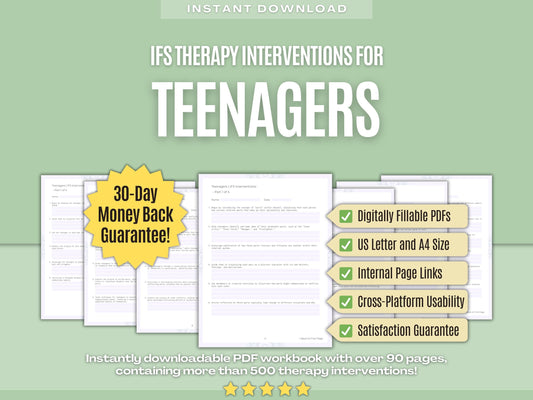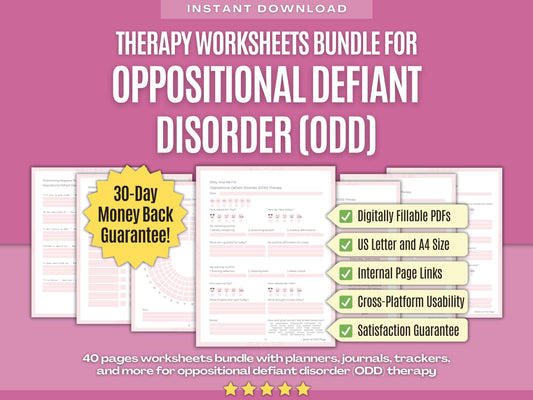Elevate Your Therapy and Guide Your Clients to Inner Healing with Our Borderline Personality Disorder (BPD) Therapy Session Questions! ✨
1. Starting Therapy for BPD
- What motivated you to seek therapy for borderline personality disorder at this particular time in your life?
- How do you envision therapy fitting into your overall goals and aspirations?
- What are your expectations for our work together in addressing your BPD symptoms?
- How have your symptoms of borderline personality disorder impacted various areas of your life, such as relationships, work, or daily functioning?
- Can you identify any patterns or triggers for your emotional instability or intense mood swings?
- Are there any aspects of your personality or behavior that you believe are particularly challenging for you or others to deal with?
- What role do you think your thoughts and beliefs play in maintaining your borderline personality disorder symptoms?
- Are there any harmful behaviors or coping mechanisms that you're aware of and would like to work on changing?
- Can you recall any significant life events or experiences that may have contributed to the development of your borderline personality disorder symptoms?
- Do you have a support system in place outside of therapy that you can rely on?
- What do you hope to achieve or accomplish through therapy in terms of managing your BPD symptoms?
2. BPD Psychoeducation
- Are you familiar with the diagnosis of borderline personality disorder, and if so, what do you understand about it?
- Can you describe any experiences you've had that align with the symptoms commonly associated with BPD?
- Are there specific aspects of BPD that you're particularly interested in learning more about?
- Are there any questions or concerns you have about the information we'll be discussing regarding BPD psychoeducation?
- What do you hope to gain from learning more about borderline personality disorder and its treatment?
- How do you currently view yourself in relation to your diagnosis of borderline personality disorder?
- Are you open to exploring how early life experiences and environmental factors may have contributed to the development of your borderline personality disorder symptoms?
- Can you identify any strengths or resources you possess that might be helpful in managing borderline personality disorder?
- How do you currently cope with intense emotions or feelings of emptiness associated with BPD?
- Can you recall any past experiences or interactions that shed light on how borderline personality disorder has affected your relationships?
- Are there any particular topics related to BPD psychoeducation that you're curious or anxious about exploring?
3. Mindfulness for BPD Management
- What are your current thoughts and feelings about incorporating mindfulness into your BPD management?
- What do you hope to gain from learning and practicing mindfulness techniques for managing borderline personality disorder?
- Are there any specific mindfulness techniques or exercises you're interested in exploring further?
- Can you identify any patterns or habits of thinking that contribute to your emotional instability?
- How do you feel about the concept of observing your thoughts and emotions nonjudgmentally, as mindfulness encourages?
- How do you think cultivating mindfulness might impact your relationships and interactions with others?
- Can you envision how mindfulness techniques might be integrated into your daily life routines?
- How do you typically handle situations when you feel overwhelmed or out of control emotionally?
- How do you currently prioritize self-care practices in your daily life, and where does mindfulness fit into that?
- What role do you think mindfulness can play in enhancing your ability to regulate your emotions and impulses?
- Are there any challenges or obstacles you anticipate encountering as you begin incorporating mindfulness into your BPD management?
4. Dialectical Behavior Therapy (DBT) for BPD
- How do you feel about incorporating dialectical behavior therapy (DBT) into your BPD treatment plan?
- What do you hope to achieve or gain from participating in DBT specifically tailored for BPD?
- Are there specific symptoms or challenges related to BPD that you're hoping to address through DBT?
- How do you typically respond to situations that trigger intense emotions or lead to impulsive behaviors?
- What strategies do you currently use to cope with distressing emotions or impulses?
- How do you envision integrating the skills and techniques learned in DBT into your daily life outside of therapy sessions?
- Are there any specific DBT skills or modules you're particularly interested in exploring further?
- Can you identify any patterns or themes in your experiences that align with the core concepts of DBT, such as mindfulness, distress tolerance, emotion regulation, and interpersonal effectiveness?
- What role do you think interpersonal effectiveness skills can play in improving your relationships and interactions with others?
- How do you envision incorporating the principles of mindfulness into your daily life routines to support your BPD management?
- What are your expectations regarding the structure and format of our DBT sessions?
5. Interpersonal Therapy (IPT) for Relationship Skills
- How do you feel about exploring interpersonal therapy (IPT) as a means of improving your relationship skills in the context of borderline personality disorder (BPD)?
- What do you hope to achieve or gain from participating in IPT specifically tailored for enhancing relationship skills?
- Are there specific interpersonal difficulties or patterns in your relationships that you'd like to address through IPT?
- How do you typically respond when conflicts or misunderstandings arise in your relationships?
- What strategies do you currently use to manage your emotions and behaviors in the context of interpersonal interactions?
- How do you envision integrating the insights and skills gained from IPT into your daily life and interactions outside of therapy sessions?
- Are there any specific techniques or exercises used in IPT that you're particularly interested in exploring further?
- Can you identify any maladaptive patterns of communication or interaction that contribute to difficulties in your relationships?
- What role do you think empathy and perspective-taking play in building and maintaining healthy relationships?
- Can you identify any goals you have for yourself in terms of developing and implementing strategies to improve your relationship skills?
- How do you envision your relationships being different once you've made progress in developing and implementing skills through IPT?
6. Emotion-Focused Therapy (EFT) for BPD
- How do you feel about incorporating emotion-focused therapy (EFT) as part of your treatment for borderline personality disorder (BPD)?
- What do you hope to achieve or gain from participating in EFT specifically tailored for BPD?
- Are there specific emotions or emotional experiences that you find particularly challenging to manage, and that you'd like to address through EFT?
- How do you typically respond when faced with intense emotions or emotional triggers?
- What strategies do you currently use to cope with distressing emotions or regulate your emotional responses?
- How do you envision integrating the insights and skills gained from EFT into your daily life outside of therapy sessions?
- Are there any specific techniques or exercises used in EFT that you're particularly interested in exploring further?
- Can you identify any maladaptive beliefs or patterns of thinking that contribute to difficulties in regulating your emotions?
- What role do you think self-compassion and self-validation play in the process of working through difficult emotions in therapy?
- Can you identify any goals you have for yourself in terms of developing and implementing strategies to regulate your emotions more effectively?
- How do you envision your emotional experiences being different once you've made progress in working through them with the support of EFT?
7. Psychodynamic Approaches for Deep Understanding
- How do you feel about exploring psychodynamic approaches as part of your therapy for borderline personality disorder (BPD)?
- What do you hope to achieve or gain from participating in therapy that incorporates psychodynamic insights specifically tailored for BPD?
- Are there specific aspects of your personality or past experiences that you believe might be contributing to your BPD symptoms, and that you'd like to explore further in therapy?
- How do you typically view yourself and your relationships with others in the context of your BPD symptoms?
- What strategies do you currently use to cope with difficult emotions or navigate interpersonal relationships, and how do you think these strategies might be influenced by unconscious processes?
- How do you envision integrating the insights gained from psychodynamic therapy into your daily life outside of therapy sessions?
- Are there any specific psychodynamic concepts or theories you're particularly interested in exploring further?
- Can you identify any unresolved conflicts or emotional wounds from your past that you believe might be contributing to your current struggles with BPD?
- What role do you think insight and self-awareness play in the process of healing and recovery from BPD within a psychodynamic framework?
- Can you identify any goals you have for yourself in terms of gaining insight into and resolving unconscious conflicts or emotional wounds?
- How do you envision your life being different once you've gained deeper insight into the unconscious processes influencing your BPD symptoms?
8. Music Therapy for Emotional Support
- How do you feel about incorporating music therapy as part of your treatment for borderline personality disorder (BPD)?
- What do you hope to achieve or gain from participating in music therapy specifically tailored for BPD?
- Are there specific emotions or experiences that you find particularly difficult to express or manage, and that you'd like to explore through music?
- How do you typically use music in your daily life to soothe yourself or express how you're feeling?
- What types of music do you find most comforting or empowering when you're feeling overwhelmed or distressed?
- How do you envision integrating the insights gained from music therapy into your daily life outside of therapy sessions?
- Are there any specific musical techniques or exercises you're particularly interested in exploring further?
- Can you identify any emotions or experiences that you've been struggling to express, and that you'd like to explore through music therapy?
- What role do you think rhythm, melody, and lyrics play in the process of expressing and processing emotions through music?
- Can you identify any goals you have for yourself in terms of using music therapy to explore and support your emotional well-being?
- How do you envision your relationship with music evolving as you continue to explore and work through your BPD symptoms in therapy?
9. Concluding BPD Therapy Sessions
- Looking back on our therapy journey together, what are some of the most significant insights or realizations you've gained about yourself and your experiences with borderline personality disorder (BPD)?
- Can you identify any specific skills or coping strategies that you've developed or refined during our time in therapy that you feel will continue to serve you well moving forward?
- Are there any particular moments or sessions from our time together that stand out to you as especially meaningful or transformative?
- Can you identify any challenges or setbacks you've encountered during therapy, and how you've worked through them?
- How do you plan to apply the insights and skills you've gained from therapy to your everyday life and interactions moving forward?
- How do you feel about the prospect of transitioning out of therapy and continuing to navigate your journey toward healing independently?
- What strategies do you intend to use to maintain your progress and manage any challenges that may arise after therapy concludes?
- Can you reflect on any changes in your relationships with others that you've noticed as a result of your work in therapy?
- What role do you think ongoing self-reflection and personal growth will play in your continued journey toward healing from BPD?
- How do you plan to stay connected with yourself and your emotional experiences as you navigate life beyond therapy?
- How do you envision incorporating mindfulness and self-awareness practices into your daily life post-therapy?
10. Final Reflections on BPD Therapy
- As we come to the end of our therapy journey together, what thoughts or feelings come up for you?
- Can you reflect on the progress you've made since starting therapy, and how you feel about the changes you've noticed in yourself?
- Are there any specific skills or coping strategies that you've learned in therapy that you feel particularly proud of or grateful for?
- Can you identify any challenges or obstacles you encountered during therapy, and how you worked through them?
- Looking ahead to the future, what aspirations or goals do you have for yourself in terms of managing your BPD symptoms and living a fulfilling life?
- What role do you envision ongoing self-care practices playing in your continued journey toward emotional well-being and resilience?
- How do you plan to maintain your progress and manage any challenges that may arise after therapy concludes?
- How do you feel about the prospect of transitioning out of therapy and continuing to navigate your journey toward healing independently?
- How do you plan to stay connected with yourself and your emotional experiences as you navigate life beyond therapy?
- Can you identify any patterns or behaviors that you're committed to changing or addressing as part of your ongoing recovery from BPD?
- Are there any unresolved issues or topics from therapy that you feel require further exploration or closure before concluding our sessions?
We hope that our therapy session questions for Borderline Personality Disorder (BPD) therapy will help you to elevate your therapy practice and guide your clients to inner healing! Do you need more therapy session questions for Borderline Personality Disorder (BPD) therapy? Find them all in our Digital Workbook! Or do you have any questions or suggestions for us? Please feel free to contact us at any time!


















